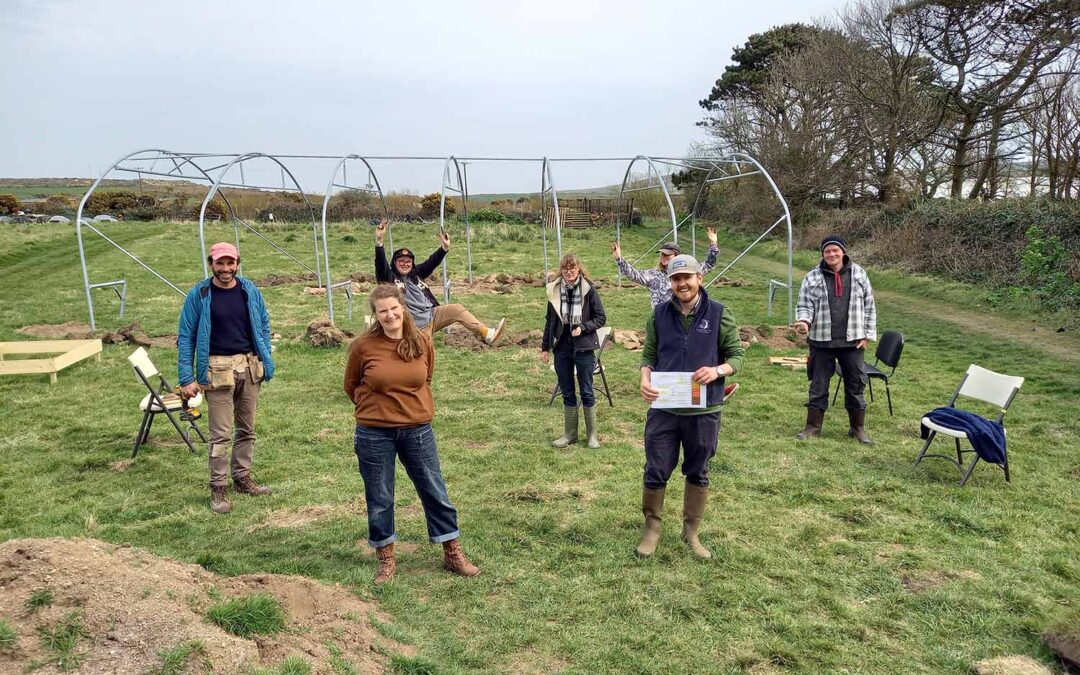PEOPLE have been getting their hands dirty with us at a community-owned farm near St Just as part of a food-related employment project.
We joined Bosavern Community Farm on Tuesday 30 March to share soil health tips with students taking part in the farm’s Training and Work Experience Project, which is funded by the European Union with support from Cornwall Council.
Katie Kirk from Bosavern Community Farm said: “Our supported placements are for unemployed adults with an interest in horticulture.
“We provide practical work experience and training on the farm; creating opportunities to practice communication, teamwork, problem-solving and food-related skills, all of which boost confidence.
“Ultimately, we aim to help people move into formal training or employment in areas such as retail, catering, farming, horticulture, gardening, conservation, construction or grounds maintenance and we will soon be opening for new registrations for our next course in May to July.
“The sessions were very informative, perfectly pitched for our trainees from varying backgrounds and complemented our day-to-day work experience; explaining why we use the techniques we do on the farm and setting it within both a broader, environmental context.
“It was great that we also had the chance to get hands-on, digging soil inspection holes and comparing soil samples brought in from home.”
We have been working extensively across the region for more than 25 years to educate and support farming communities and individuals to implement best practices that have a positive outcome on water quality.
In 2019, we created the Devon and Cornwall Soils Alliance (DCSA) to build capacity and capability in soils advice across Devon and Cornwall.
Our Cornwall Fisheries Team Leader and Senior Land Officer Giles Rickard said: “Integral to water quality is soil health and it has been very rewarding to share our knowledge with people who will hopefully go on to work in a variety of roles where an understanding of the plant-to-plate process will be useful.”
The students also heard from Bosavern Board member Holly Whitelaw who delivered a talk on regenerative agriculture and the benefits for both climate and human health.
To find out how to get involved with DCSA, visit wrt.org.uk/project/dcsa/ or go to bosaverncommunityfarm.org.uk/bosavern-training-work-experience/ to find out about the next training course, email [email protected] or call Katie on 01736 272367.
ENDS
Photo: Giles Rickard (pictured front right) with the participants and staff at Bosavern Community Farm’s soil health session.
Editor’s Notes
WRT
Our charity has been restoring and protecting the region’s water environments for more than 25 years. Our work is underpinned by a commitment to the resilience of the region’s freshwater resources. Whether working with farming or fishing communities, improving river habitats, mapping landscapes, or monitoring streams, it is all to bring rivers to life and keep them healthy for wildlife and people, both now and in the future.
The Devon and Cornwall Soils Alliance (DCSA) launched on 3 June, 2019. The aim of the alliance is to build capacity and capability in soils advice across Devon and Cornwall. It builds on work through the EU-funded Channel Payments for Ecosystem Services (CPES) project, and the EU-funded Risk Aqua Soil (RAS) project.
Bosavern Community Farm
Bosavern Community Farm is run by Bosavern Community Enterprises Ltd, a not-for-profit social enterprise. It grows fresh vegetables using organic principles, has several beehives producing Cornish Black Bee honey, and raises free-range chickens (for the sale of eggs). The farm delivers fresh vegetables, herbs, salad leaves, eggs, and honey to the local community through a weekly veg box scheme, to the Farm Shop, farmers’ markets, and nearby pubs, cafés, and restaurants. It has 36 acres of land with seven acres under cultivation (with a new field about to be cultivated by local allotment holders) and some for hay. There are six polytunnels, a fruit cage, raised beds, and several outbuildings including an education space, The Seed Box, and a community-built cob roundhouse.

